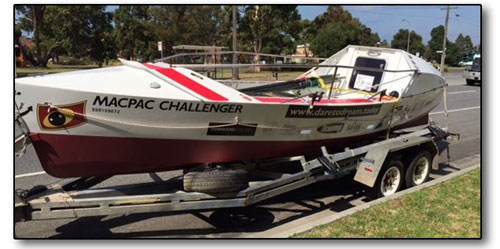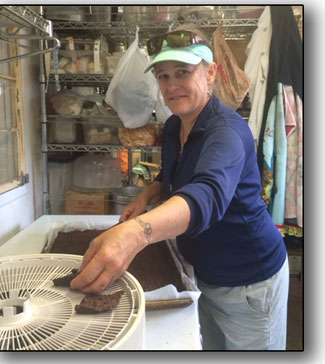
The 3,000-mile journey is being made on a 25-foot high-tech row boat, the MacPac Challenger. It’s fitted with storage, sleeping quarters, solar panels and more than 400 pounds of dehydrated food prepared in Durango./Courtesy photo
Fueling the dream
Community steps up to support 90-day rowing trip across Atlantic
by Tracy Chamberlin
One week ago, two men in a row boat set out from a harbor in New York City. If all goes as planned, in less than three months, they’ll make their way across the Atlantic Ocean to London. And the only thing fueling that journey is the people of Durango.
“It was a real community effort,” said Pete Fletcher, who, along with fellow Aussie Tom Hudson, is currently rowing his way toward the team’s first checkpoint.
Follow the voyageTo keep an eye on Pete Fletcher and Tom Hudson’s 3,000-mile journey across the Atlantic Ocean, check out www.daretodream.today or www.facebook.com/daretodream.macpacchallenger. |
They’re making the trip on a 25-foot boat christened the MacPac Challenger. It’s fitted with storage, sleeping quarters, solar panels to charge equipment and more than 400 pounds of dehydrated food prepared right here in Durango.
Rather than the typical high-sugar, high-carbohydrate diets used by many athletes, Fletcher and Hudson turned to one based on a high-fat, low-carb formula eaten by the Inuit tribes from the northernmost parts of North America.
This type of diet, developed in Australia for the purpose of endurance performance, has a slow release of energy over a long period of time instead of the blood sugar roller coaster that comes with high sugar and high carbs.
The rub is that the Inuit menu isn’t available at the corner store. “You can’t just buy that kind of food,” Fletcher said.
This is where the local community stepped in to help.
Fletcher is the nephew of Durangoans Chris and Tecumseh Burnett, who went in search of someone to put together the rowers’ high-fat, high-carb menu.
They turned to Linda Illsley, of Linda’s Local Food Café. Illsley is in the process of selling her business so she can focus on working with local farmers, but when the Burnetts contacted her, she still had access to the café kitchen.
Needing 10,000 calories a day just to keep the rowers warm, it is easy to see how important food can be, Illsley said.
The menu consisted of eight recipes in total, divided by caloric value. All of it was cooked, dehydrated and packaged into two-day portions to prevent spoiling.
It included such things as lamb hearts (high in protein and iron), chicken skins, chocolate spread, fish jerky and blueberry crumble.
Illsley used as many local ingredients as possible, including beef, pumpkins and more. Some of the items, however, were more elusive.
“We had some fairly unusual ingredients in high quantities,” Fletcher explained.
Illsley turned to the network of farmers and other providers she amassed as the owner of Linda’s.
She found vendors in Boulder who could supply coconut oil and chicken skins, and others were able to help her find the lamb hearts.
“It was definitely a challenge,” she said.
Finding the ingredients, however, wasn’t the only challenge. The deadline for the preparation and packaging was just over three weeks.
Illsley worked the first two weeks without a day off, but it still would not have been enough to prepare all the food Fletcher and Hudson needed for their 90-day journey.
“It became apparent pretty quickly it was too much for one person,” Tecumseh explained.
With the clock ticking on food preparation, as well as getting the boat and all the equipment ready, Fletcher and Hudson needed to trust in others to get it all done, Burnett said.
And, that’s exactly what happened.
Their ability to trust in the dream and the people who supported that dream was inspiring, she added. “This goes to show you the power of a vision.”
Between Illsley, Burnett and all the volunteers, it took more than 115 hours to cook the food and about 60 more to pack it up.
Illsley said it would have been best to package the food and hold it for a month to see what it did. But with the 3½-week deadline looming, there wasn’t time to make sure all the foods could be checked after 90 days.
 Tecumseh Burnett, Peter Fletcher’s aunt, helps prepare some of the food for the 3,000-mile journey. The menu was based on the high-fat, low-carb traditional diet of Inuit tribes, consisting of such things as lamb hearts (high in protein and iron) and chicken skins. All the food was cooked, dehydrated and packaged in Durango./Courtesy photo |
Burnett and Illsley may have led the local effort, but they weren’t alone. Local businesses, like the Vitamin Cottage, helped track down obscure ingredients, and local residents, like members of the Fort Lewis cycling team, came out to help with cooking and preparations.
“It became a team effort, a community effort,” Illsley said. “I would have never done it without their help.”
Fletcher felt that if it wasn’t for Illsley, Burnett and the Durango community that supported them, he and Hudson wouldn’t have the food and the fuel they needed for their trip.
“Durango is amazing that way … everyone did what they had to do to get it done,” Burnett said.
After it was all said and done, the Durango team put 414 pounds of dehydrated food into 12 boxes and shipped them to New York.
Before the trip began May 21, Fletcher and Hudson got a chance to sample the menu, and Fletcher said it tasted great.
The two are about a week into the trip and well off the American coastline. They plan to hitch a ride on the Gulf Stream en route to England, becoming the first duo to row, unassisted, from New York to London.
In addition to raising funds to support the McGrath Foundation, considered one of Australia’s most recognizable charities for breast cancer support and awareness, Fletcher said the journey is about inspiring people to challenge themselves, to “dare to dream,” which is the team’s motto.
“If you believe you can do it, you can do it,” he said.
In this week's issue...
- January 25, 2024
- Bagging it
State plastic bag ban is in full effect, but enforcement varies
- January 26, 2024
- Paper chase
The Sneer is back – and no we’re not talking about Billy Idol’s comeback tour.
- January 11, 2024
- High and dry
New state climate report projects continued warming, declining streamflows
